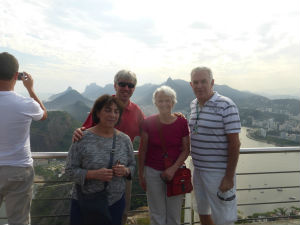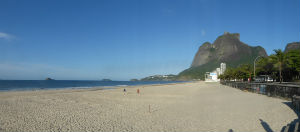
Leandro Weissmann pulled into the driveway of the Royal Tulip hotel one minute after 2:00 p.m. on Monday afternoon, and instantly apologized in a deep, gravelly voice for arriving late.
At the recommendation of IRE friends Mark Horvit and Jaimi Dowdell, we had contracted the sturdily-built, grey-haired son of an Austrian father and mother with Turkish roots to drive us around Rio.
We didn't realize that the spectacular view of the city from atop Sugarloaf was just one of the pleasures of riding with Leandro.
Dunreith was in the front.
New York Times reporter, former Duke Professor, Pulitzer Prizer winner and friend Sarah Cohen in the back.
A steady stream of commentary issued forth from Leandro as he battled traffic and his own temptation to use foul language as he took us past the adjacent neighborhoods of Ipanema and Copacabana-he pointed out this the Barry Manilow tune took place in Cuba, not Brazil-on our way to Sugarloaf Mountain.
Leandro spoke a fluent, if heavily accented, English-a product, he told us later, of having studied at an English-language school during his childhood.
Although I was disappointed to miss a day of the glorious stew of humanity at the conference, I certainly did not want either to leave Rio having seen nothing but the hotel and university when conference was being held or to have missed the chance to spend some relaxed time with Dunreith in the city that will be the center of the world's attention twice in the next three years.
Dunreith and I had already taken a long, leisurely stroll along the slightly slanted sand as the water from the waves grew closer and more forceful. A white surfboard stretched across his head, a portly man who resembled author Jon Lee Anderson walked in the opposite direction. Fathers and sons kicked a soccer ball to each other before jogging past us, passing the ball between them. Women of all sizes wore the famed Brazilian bikinis.
As the cool water tickled our feet, we talked about all that we had seen and heard at the conference the first few days and about where we might go in the next months and years.

For his part, Leandro covered all manner of subjects.
Staunchly pro-military, he told us how unhappy he was with the current state of Brazilian society.
We had it much less bad than Chile and Argentina, he declared. The only thing you couldn't do was say bad things about the president.
We didn't touch that one.
Leandro moved onto soccer, showing us a picture of him with a smiling a Pele and the yellow Brazilian jersey the man many consider to be the greatest soccer player ever had autographed for him.
This lead into a discussion of Pele's merits as compared with Argentine legend Diego Armando Maradona.
Leando was unimpressed.
How many goals did Maradona score? he scoffed. Three hundred. Pele scored 1,000 more. Shut up.
Leandro certainly did not heed his own advice, but rather launched into a series of three Argentinian jokes, the two most memorable of which went as follows:
Question: How does an Argentine commit suicide?
Answer: By jumping from the top of his ego.
An Argentine boy told his father, "Dad, when I grow up I want to be just like you."
"Why is that?"
"Because then I'll have a son just like me."
Ouch.
Back to politics.
Leandro never liked former president and Brazilian icon Lula, and was particularly disdainful of current president Dilma Rousseff, whom he labeled a former bank robber.
Asking him about the impending Teacher's Day and their ongoing strike elicited a sigh.
They are forgetting about one thing, he said. The students.
Leandro's mood did improve when he talked about his wife's recent shift on the political spectrum from the left wing to a more conservative position.
In part to reward her for this movement, he said he planned to take her to Machu Picchu later this year.
By this point we had arrived at Sugarloaf. Leandro explained that his friend who usually parked the car was not available, so instructed us to head up to the top.
The lines looked impossibly long, but putting down $25 per got us to a pair of cable cars that carried us quickly to the summit.
The view was breathtaking.

Clear, untroubled water lapped up against an impressively green city with idyllic beaches.
Leandro joined us shortly after we reached the top. He identified the city's different neighborhoods, again pointing out where the military had made a positive difference.
Time was moving, and we needed to hustle to catch the free bus that would take us from the conference to the National Theater, where a dancing performance, tribute to pioneering editor Marcos Sa Correa and awards ceremony were to be held.
On the way down, Leandro showed me a picture on his telephone of his first granddaughter who is just six months old.
His smile nearly split his face.
He looked much less happy when he discerned from the second tram that his car was being ticketed.
When the cable car stopped, Leandro hustled ahead. He was told, but did not seem entirely convinced, that he had not been given one.
Back along Copacabana and Ipanema, wading through traffic, avoiding being sideswiped along the way.
On the way back Leandro told us about his father's company and pointed out beachfront site where his parents had lived. The company made chassies for buses. His dad earned a fortune, but then took on partners who Leandro said were good at stealing.
He tried to warn his father, but he didn't listen.
The company went bankrupt in 1982.
After shedding the partners, his father built the business back up.
The government seized it in 1986, Leandro told us, a mournful sadness filling his voice.
His father told him before his death that he had been right, but the acknowledgment was little consolation.
Leandro's mood lifted before we pulled back into the Royal Tulip's driveway, paid him and thanked him for his time.
It hadn't been an afternoon at the investigative conference, to be sure.
And, somehow, Leandro's tour had plugged a hole that I had wanted to fill.
We zipped up to our room, changed our clothes and rushed back down to catch a taxi.
The evening awaited.